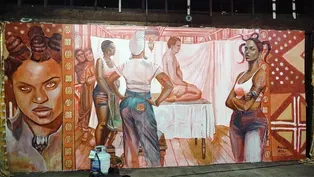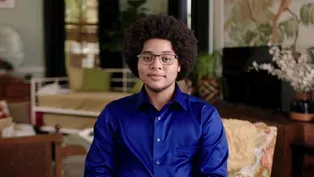
Rise of sports betting brings concerns about its promotion
Clip: 2/27/2023 | 8m 23sVideo has Closed Captions
College partnerships are bringing sports betting to campus. Are students safe?
We are weeks away from college basketball’s March Madness and billions of dollars worth of wagers on the games. As more states legalize sports betting, Paul Solman reports on the increasing concern that some colleges are too involved in its promotion. This story is a partnership with the Shirley Povich Center for Sports and the Howard Center for Investigative Journalism.
Problems with Closed Captions? Closed Captioning Feedback
Problems with Closed Captions? Closed Captioning Feedback
Major corporate funding for the PBS News Hour is provided by BDO, BNSF, Consumer Cellular, American Cruise Lines, and Raymond James. Funding for the PBS NewsHour Weekend is provided by...

Rise of sports betting brings concerns about its promotion
Clip: 2/27/2023 | 8m 23sVideo has Closed Captions
We are weeks away from college basketball’s March Madness and billions of dollars worth of wagers on the games. As more states legalize sports betting, Paul Solman reports on the increasing concern that some colleges are too involved in its promotion. This story is a partnership with the Shirley Povich Center for Sports and the Howard Center for Investigative Journalism.
Problems with Closed Captions? Closed Captioning Feedback
How to Watch PBS News Hour
PBS News Hour is available to stream on pbs.org and the free PBS App, available on iPhone, Apple TV, Android TV, Android smartphones, Amazon Fire TV, Amazon Fire Tablet, Roku, Samsung Smart TV, and Vizio.
Providing Support for PBS.org
Learn Moreabout PBS online sponsorshipAMNA NAWAZ: We are mere weeks away from college basketball's March Madness and, with it, billions of dollars' worth of wagers on the games.
As more states legalize sports betting, Paul Solman reports on worries that some colleges are too involved in its promotion, a particular concern since, in all but four states, residents must be 21 years old to place a legal bet.
This story is a partnership with the Shirley Povich Center for Sports Journalism and the Howard Center for Investigative Journalism, both at the University of Maryland's Merrill College of Journalism.
SAUL MALEK, Former Gambler: I'm winning.
Then I feel like an idiot for not betting higher and betting more often.
PAUL SOLMAN: Saul Malek, betting on sports through an online bookie at his Texas college in 2017.
SAUL MALEK: With my strategy, I can make hundreds of dollars in a minute.
PAUL SOLMAN: Once, says Malek: SAUL MALEK: I was up a few thousand credit that week, and I lost it all betting on someone in an individual tennis game.
And I didn't even know if it was a man or a woman.
PAUL SOLMAN: Eventually, he owed nearly 10 different bookies between $15,000 and $20,000.
In 2018, the U.S. Supreme Court struck down a ban on sports gambling, making it even easier to bet.
More than 30 states have legalized sports gambling since, and enticing ads are now everywhere.
KEVIN HART, Actor: Two hundred dollars instantly just for betting five bucks.
PAUL SOLMAN: Offering free first bets.
And now five major colleges, Michigan State, LSU, Maryland, University of Denver, and the University of Colorado, have announced multiyear partnerships with sports betting companies that include placing ads at games, along with promises to, for example, focus on responsible gaming and education.
Colorado was actually paid for bets made using a university promo code, until that deal became public.
ANDREW ZIMBALIST, Smith College: I think it's very scary.
PAUL SOLMAN: Sports economist Andy Zimbalist.
ANDREW ZIMBALIST: There are many colleges now that are jumping into bed with sports book companies.
They're allowing the sports book companies to come onto campus and to appeal to the students to get involved in gambling.
PAUL SOLMAN: Hey, I gamble on sports.
It can be fun, sometimes lots of fun, but, says Zimbalist: ANDREW ZIMBALIST: Six percent of betters tend to become problem or compulsive gamblers.
So, we're talking about tens of thousands of students who are likely to become or if they're not already problem gamblers.
PAUL SOLMAN: Students like these at the University of Maryland.
JOEY HAAVIK, College Student: To introduce something like gambling on campus seems like putting kerosene on a fire.
AYELETTE HALBFINGER, College Student: If there is supposed to be some sort of educational aspect about betting cultures, the negative ramifications that betting can have on students, particularly at a young age, why aren't we seeing that side of a program?
PAUL SOLMAN: Now, some Maryland students said they like the partnership, but not social work professor Greg Stewart.
GREGORY STEWART, University of Cincinnati: I am concerned that certainly the state of Ohio has made this an option.
PAUL SOLMAN: Stewart studies addiction at the University of Cincinnati in Ohio, where sports betting became legal last month.
GREGORY STEWART: It's so convenient for people to engage in this experience, the use of my phone, and I don't have to go anywhere.
I don't have to talk to anyone.
PAUL SOLMAN: You could do it in class.
GREGORY STEWART: You could.
PAUL SOLMAN: And as MIT finance Professor Andy Lo once told me: ANDREW LO, MIT: Neuroscientists have documented that the component of the brain that gets stimulated when we engage in financial rewards is really the same component that is stimulated by cocaine.
It's the dopamine system.
KEITH WHYTE, Executive Director, National Council on Problem Gambling: We have seen a big spike since 2018 in risk for gambling problems.
PAUL SOLMAN: Keith Whyte is tracking that impact at the National Council on Problem Gambling, supported in part by the gaming industry.
KEITH WHYTE: Our national surveys between 2018 and 2021 show a roughly 30 percent increase in risk for gambling problems nationwide.
But the majority of that increase in risk is among those young male online gamblers.
People with gambling problems have much higher rates of substance use and abuse.
But what we're really concerned about are things like the very, very high rate of depression amongst people with gambling problems and also a very high rate of suicidal behavior.
PAUL SOLMAN: College kids, especially young men, are more vulnerable than most because they think they know sports, they like risk, and they are comfortable doing everything on their phones.
FMR.
GOV.
MITCH DANIELS (R-IN): Much of the promotion that the gaming companies have sought to bring to college campuses seems pretty clearly aimed at building new customers.
PAUL SOLMAN: And that's the problem, says former Indiana Governor Mitch Daniels, who wouldn't allow any betting on Purdue University sports when he was, up until recently, president there.
FMR.
GOV.
MITCH DANIELS: Young people are facing more emotional and mental and psychological challenges, it appears, than they have before.
At a minimum, schools should be careful not to be facilitating, enabling, and, while they're doing so, profiting off the marketing that might spread this behavior further.
PAUL SOLMAN: So, are they?
All universities declined our five requests for interviews.
The University of Colorado sent a statement -- quote -- "The last two years have demonstrated that the necessary safeguards are in place to ensure this agreement is beneficial and safe.
The betting companies involved just didn't respond."
But Martin Lycka of Europe's Entain did.
And his is one of the world's largest gambling companies.
MARTIN LYCKA, Entain: I strongly believe that any country, including the United States, is much better off having regulated this space and help drive out the black market, the unlicensed bookmakers that afford their customers absolutely no protection tools, no nothing, than continuing to step in the dark.
PAUL SOLMAN: If you were running a university now, would you invite in your company or another sports betting company, or would you say, no, too much risk, too many young people?
MARTIN LYCKA: I definitely would, because the young people -- now, we are filming this right after the Super Bowl, so all of them arguably would have gotten exposed to gambling-related adverts in the TV coverage.
PAUL SOLMAN: But does your company have any deals with universities to do advertising, sponsorship and the like?
MARTIN LYCKA: No.
That is a categorical no.
My company has no commercial partnerships with universities.
PAUL SOLMAN: And will you never?
MARTIN LYCKA: No, we never will for those reasons you have just alluded to, because a shattering majority of college students are underage.
They're under 21, and they have got nothing to do on the gambling side.
So that is not our target audience.
That is not the industry's target audience.
PAUL SOLMAN: But how can it not be the target audience of firms that partner up?
In which case, why should universities allow it?
Well, says a former congressman: FMR.
REP. TOM MCMILLEN (D-MD): I don't think you can stop sports betting on college campuses.
PAUL SOLMAN: Also a former Maryland basketball star, Tom McMillen winces at the partnerships, like his own alma mater's.
FMR.
REP. TOM MCMILLEN: But this is unique America.
that you're going to have betting on campuses, on events on campuses.
And I think there are risks to higher education with that, but it is almost inevitable.
You have this huge sports enterprise on campuses across the country.
And so universities are adopting it, much like they adopted beer drinking and liquor at football games.
PAUL SOLMAN: As for Saul Malek, he went into rehab four years ago and is still in recovery, still paying off his debts, and more worried than ever about college kids, like he once was.
SAUL MALEK: It doesn't seem like you could just go off to college and lose your entire livelihood gambling, and you just don't know any better.
PAUL SOLMAN: Until, for an estimated tens of thousands of U.S. undergrads a year, if all colleges were to follow suit, it will be too late.
For the "PBS NewsHour," Paul Solman.
Artist works to correct narrative of gynecology's beginnings
Video has Closed Captions
Clip: 2/27/2023 | 8m 43s | Alabama artist works to correct historical narrative around beginnings of gynecology (8m 43s)
A Brief But Spectacular take on the power of a name
Video has Closed Captions
Clip: 2/27/2023 | 3m 17s | A Brief But Spectacular take on the power of a name (3m 17s)
Crime top issue for many voters in Chicago's mayoral race
Video has Closed Captions
Clip: 2/27/2023 | 7m 4s | Crime becomes top issue for many voters in Chicago's mayoral race (7m 4s)
Government to crack down on companies exploiting child labor
Video has Closed Captions
Clip: 2/27/2023 | 6m 57s | Biden administration vows to crack down on companies exploiting child labor (6m 57s)
Renewed wave of violence breaks out in West Bank
Video has Closed Captions
Clip: 2/27/2023 | 6m 5s | Renewed wave of violence between Palestinians and Israelis breaks out in West Bank (6m 5s)
Providing Support for PBS.org
Learn Moreabout PBS online sponsorshipSupport for PBS provided by:
Major corporate funding for the PBS News Hour is provided by BDO, BNSF, Consumer Cellular, American Cruise Lines, and Raymond James. Funding for the PBS NewsHour Weekend is provided by...















